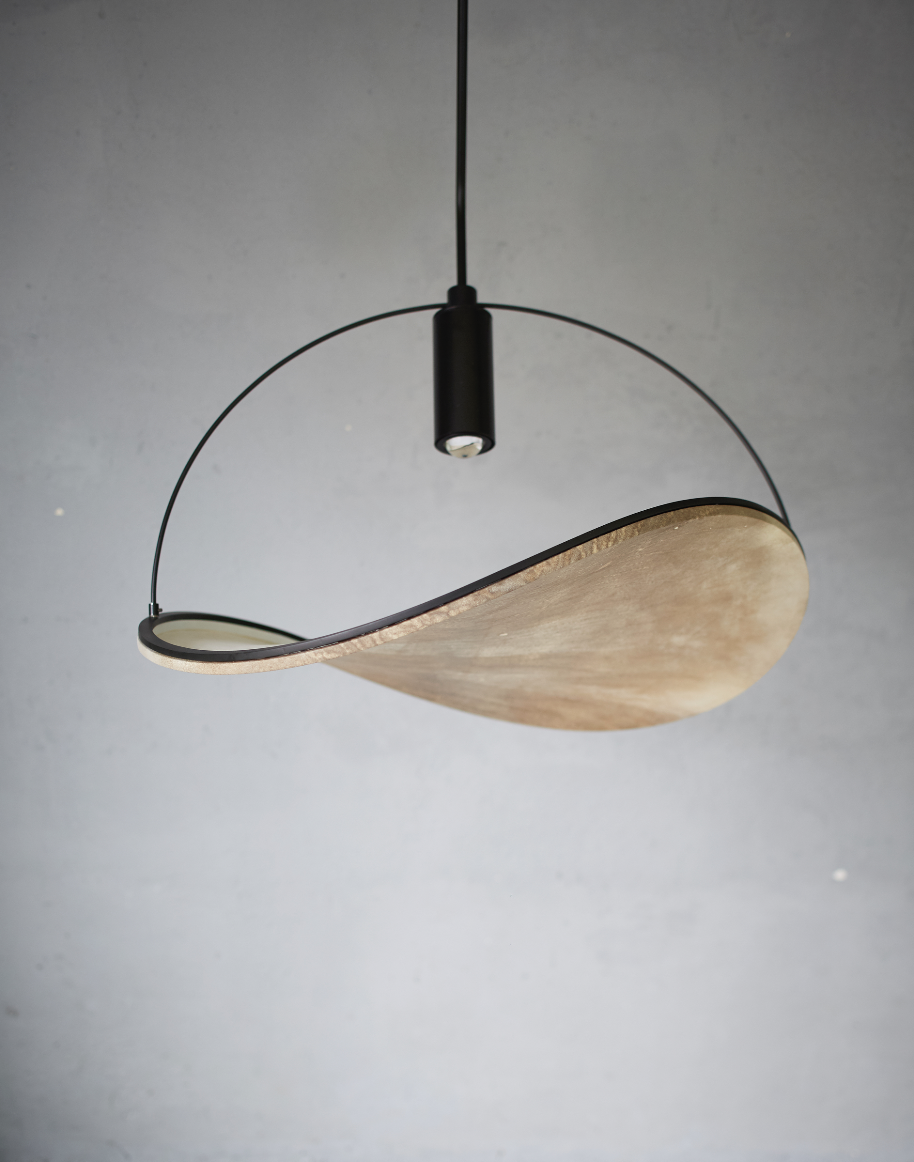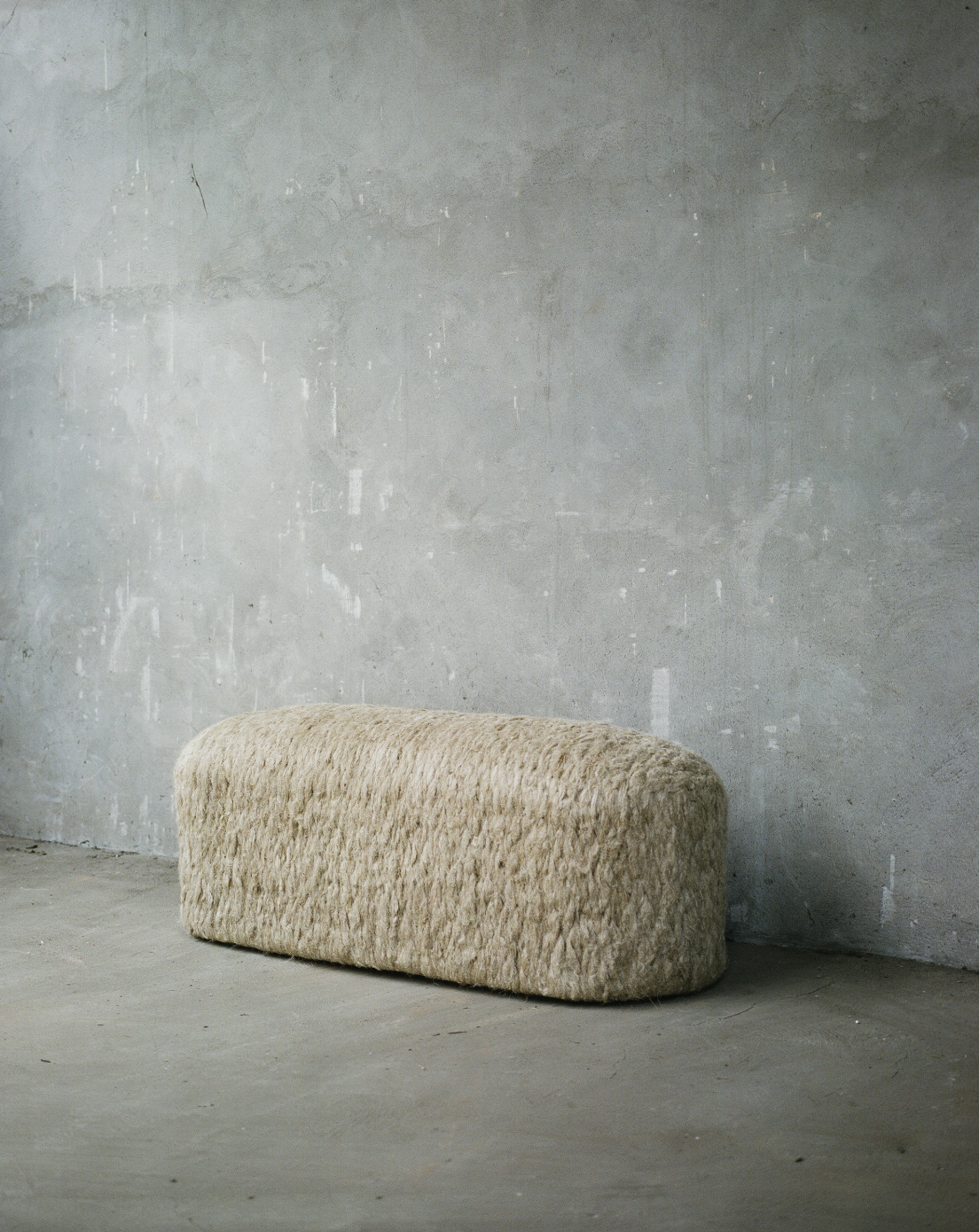Pauline Esparon on Raw Materials
Words by Matthew Burgos
L'ECOUCHEUR, 2019
Before Pauline Esparon inoculates her furniture and design with her penchant for preservation, she digs into the history of the materials she will incorporate. From the founding of these matters down to their production and recycling rates, her research defines her work and the story behind every piece she creates. In her words: objects are plural where they constitute a collection, an ensemble, an atmosphere.
Drawn from this doctrine, she toys with the notion of rawness, a form of archaism and the birth state of the materials prior to the manipulation of the industry’s machinery. She veers off from selecting a single material to inject into her body of work. She sources from the vegetal, the animal, and the mineral before infusing them into the byproduct of her studies, frame of mind, and reverence for sustainability.
L'ECOUCHEUR, 2019
“Each project envisions a proposition to tweak the production for the better and consider processes, purposes of production, and perspectives for crafts.”
She approaches this mindset almost in an environmentally literal sense, comparing it to the tangibility of the abstract concepts sustainability has put forward for the consumers to consume. Here, she questions the quality and the culture of the materials, paying homage to understand their heritage, how they have weathered the climate, history, and society, and their scientific systems which may affect their production. As she describes her ethics at work: “Each project envisions a proposition to tweak the production for the better and consider processes, purposes of production, and perspectives for crafts.”
Her educational and professional backgrounds have harnessed her eyes and hands in procuring her materials. Her two-year technical degree and foundational courses in Fashion and Environment at Duperré School of Applied Arts in Paris between 2012 and 2014 nudged her to dive into the design realm of her studies, which included textiles, materials, surfaces, exiting the institution with a mark of cum laude. When she studied at Design Academy Eindhoven between 2015 and 2019, her introductory year granted her access to a myriad of methodologies and media that may form part of a design such as drawing, imaging, prototyping, reflecting, experimenting, analyzing, communicating, and performing. Bringing such a diverse background with her, she flew to Switzerland at École cantonale d'art de Lausanne for a year in 2017 to study Industrial Design as part of her exchange program. With the amalgamation of her knowledge, Pauline wore her hat in design and stepped into furniture-making.
65 LITERS, 2017
A brief environmental study published by the Hazardous Substance Research Centers and South & Southwest Outreach Program underscores the impact of the petroleum industry on the environment, which includes air, water, and soil pollution hazards. “Some of the chemicals released are known or suspected cancer-causing agents, responsible for developmental and reproductive problems. Some refineries use deep-injection wells to dispose of wastewater generated inside the plants, and some of these wastes end up in aquifers and groundwater,” the research states. Although contamination of soils from the refining processes may have less impact when compared to contamination of air and water, they may also aggravate certain respiratory conditions such as asthma. “Along with the possible health effects from exposure to these chemicals, these chemicals may cause worry and fear among residents of surrounding communities.”
In response to this, Pauline collaborated with Alban Lapie maître savonnier in crafting tables titled 65 Liters. As she describes it: “In 2016, we consumed 179 million liters of oil, creating a problematic and increasing waste. This project tries to give value to this massive leftover from a design perspective. The oil is solidified into a stone-like material, sliding from repeal to delicacy.” Her work amplifies how much society wastes what it thinks to benefit its people by transforming the liquid into a tangible product consumers may keep and use in their homes.
PELLIS, 2019
Moving forward, she has fleshed out parchment as a cloth covering the harsh light of a lamp, lightly twisting the shape to resemble the gentle waves of the sea while hovering in the air. In this collaboration with Bodin-Joyeux, the designer highlights parchment as the primary material for Pellis. “Parchment has allowed the transmission of maps and texts containing the knowledge that constitutes us, but with the rise of paper, the use of parchment as a sheet to write on decreased,” writes Pauline. “This project aims to stimulate the craft of parchment by exploring new shapes and tensions of the material and by highlighting its origin, the animal. The process of the object allows the skin to express itself by bending naturally when drying, while the light projects the being behind the surface and the inner poetry of a temporary life fixed forever. Scars, diseases, and patterns can be meaningful in tracing the story of the animal, making itself a page to be read.”
She takes no rest from there as she swears to faithfully preserve the heirlooms of mankind through poetic craftsmanship. The alcoves of Pauline’s beliefs for sustainability have geared towards the creation of L'ECOUCHEUR, a series of furniture and design made primarily of flax. She has crafted a coffee table supported by three blocks, carpet, blanket, couch, and some sleeping mats. The designer mentions how the industrialization of flax has stripped its raw richness, which contrasts its sustainable growth. “80% of flax nowadays has to be exported and then reimported as linen,” she begins. “Here, the quality of flax is highlighted using the raw scutched fibers and the wasted short stem. Colors, textures, and patterns allow purposing unusual tactility and an expressive dimension.”
L'ECOUCHEUR, 2020
For her cushioned stools and sofa, Pauline combs the short linen of fibers, stuffs the furniture the same through a traditional upholstery technique, and retains the flax’s look on the exterior to express the animal-like, wooly quality of the material. Her bench and rug also employ raw flax fiber: the former toys with the natural range of colors depending on the soil, weather, and harvest time of the flax while the latter combines felt beneath and on the sides with 100% linen. The blanket fabricates stitched, long fibers of flax to retain the bright and glossy look of the fiber, manifesting natural creases that add up to the tactility and comfort of the design.
Based on the description Council of Fashion Designers of America put up on their material index: “Flax is considered a more rare, high-quality product and represents less than 1% of all textile fibers consumed worldwide. In terms of sustainability, flax is often considered a preferred fiber with less harmful environmental impact. Two different kinds of flax are grown: flax for fiber, which is used to make linen textiles, and flax for seed, which is used to feed people and livestock. The majority of flax for fiber is still produced in Western Europe - France is the world leader - though most of it travels to China for textile processing. Flax has a high natural luster and is often marked by irregular fiber bundles and texture. The natural color of flax can range from beige to light grey.” Through this, Pauline recalibrates flax to her liking, adding her subtle nuance for calm imagery while restoring and retaining the gifts of the material’s rawness.
L'ECOUCHEUR, 2020
“Here, the quality of flax is highlighted using the raw scutched fibers and the wasted short stem. Colors, textures, and patterns allow purposing unusual tactility and an expressive dimension.”
To slow down and feel the hum raw and sustainable materials elicit, to have agency over the products she envisions to produce rather than relying on the commercial process, and to lighten the weight of consumerism for the ungracious deduction of quality in production: the footprints of Pauline Esparon in the design field cement her advocacy to research first before creating and to preserve the naturality of the materials she works on. In return, she unveils swathes of thoroughly and introspectively made designs and furniture for the public to see, own, and preserve.
L'ECOUCHEUR, 2020












